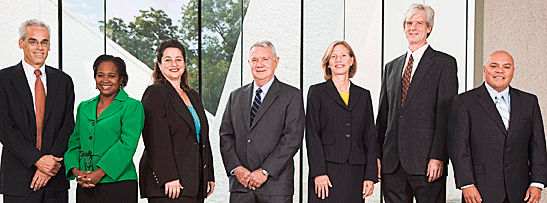Investigative Report
Austin city manager finalist Platt drops out
Six council members and numerous lobbyists appear to have criminally violated city’s lobby law
Austin-Bergstrom International Airport sets records but CEO is out
Sworn Financial Statements
Updated Friday, June 3, 2011, 2:30pm
May Have Violated Austin City Code
Sworn Financial Statements Give Public
Tools to Monitor Their Elected Officials
Investigative Report by Ken Martin
© The Austin Bulldog 2011
City Council Members Chris Riley and Randi Shade may have violated the Austin City Code by not reporting the financial activity of their domestic partners.
Many financial statements filed by the mayor and other council members are incomplete or erroneous, and one annual statement is missing.
Perhaps a larger problem is that neither these elected officials (with some exceptions) nor the city staff is paying sufficient attention to ensure that these important statements are accurately prepared to fully comply with state law and the City Code. The penalties that apply to the more serious violations are not being enforced. And citizens are kept in the dark because few are aware these documents exist or where to find them.
These problems were discovered during The Austin Bulldog’s broader investigation aimed at bringing greater transparency to city government by giving citizens the tools to monitor the conduct of their elected officials.
Do Austin’s mayor and council members have conflicts of interest in the decisions they make? How would you ever know?
Aside from the fact that these officials are required to withdraw from even discussing something in which they have a substantial interest, the public is entitled to be informed of their financial interests so they can observe and monitor how these officials conduct themselves.
System lacks transparency
Records Management Training Lacking
From 2007 Until Lawsuit Filed
Only One Current Staff Member Had
Taken Training, City Records Show
Investigative Report by Ken Martin
© The Austin Bulldog 2011
The bad news is that the staff of the mayor and council members had not taken any training in managing local government records in many years.There are no state or local laws that make such training mandatory.
The good news is these employees started taking this training soon after The Austin Bulldog filed a lawsuit against the mayor, council members, and City of Austin over failures to comply with the Texas Public Information Act, Government Code Chapter 552.
The Austin Bulldog’s April 6 report detailed deficiencies in how council members and their staff have failed to collect, assemble, and maintain local government records as required by the Local Government Records Act and the city’s Local Government Records Control Schedules. The city also permitted every city official and employee to conduct public business by creating or receiving local government records via e-mail and to keep them secret by using personal e-mail accounts.
These recordkeeping deficiencies make it virtually impossible for city officials to respond in a complete and timely manner to requests filed by citizens and journalists under the Texas Public Information Act.
As reported by The Austin Bulldog April 15, the City Council has adopted a new policy to require council members and the officials they appoint to use city e-mail addresses as the primary means of communicating via e-mail. When personal e-mail accounts are used for city business the policy requires prompt forwarding to a city account.
The council directed the city manager and city clerk to develop similar policies for other city employees and members of sovereign boards and commissions.
Dearth of records management training
City Council Records Retention Problems
by Lack of Controls Over Deletion of E-mails
Missing Records Likely More
Important Than Gossipy Tidbits
Investigative Report by Ken Martin
© The Austin Bulldog 2011
The Austin American-Statesman and some television reports had a field day serving up e-mail exchanges among the mayor and council members that reveal the proclivity of some officeholders to hold side discussions among themselves during council meetings in which they demeaned certain citizens and showed a lack of confidence in high-level employees, including the city manager, an assistant city manager and the fire chief.
This rush to dish the dirt out of the e-mails that have been released—in response to open records requests filed under the Texas Public Information Act, first by The Austin Bulldog and later the Statesman and other media—has been entertaining, in a sense, and has triggered profuse apologies from the offending officeholders. A heaping helping of humble pie has been served up and choked down.
What has not been reported is how these elected officials, and their staff members, may be failing to properly manage e-mails and other correspondence to make sure that local government records are collected, assembled, and maintained in accordance with the Local Government Records Act.
At present, the city permits every city official and employee to conduct public business by creating or receiving local government records via e-mail and to keep them secret by using personal e-mail accounts.
The city also permits every official and employee who uses a computer to choose—without review by anyone else—when to delete local government records in the form of e-mails created or received on the city’s computers. Once e-mails are deleted, the right of access to them through the Texas Public Information Act, Government Code Chapter 552, is soon permanently lost.
The city’s failure to comply with the Texas Public information Act and the Local Government Records Act was the basis for the lawsuit, The Austin Bulldog v. Mayor Lee Leffingwell, et al, as reported March 2. The city has until April 11 to file its initial reply to the pleadings.These shortcomings are also the basis for The Austin Bulldog's complaint filed with County Attorney David Escamilla,as reported March 23.
The city’s response to The Austin Bulldog’s open records requests for deleted e-mails indicate that some e-mails that should have been retained are being deleted.
Records retention basics
Whole Lot of Meetin’ Goin’ On
Whole Lot of Meetin’ Goin’ On
Council Member Chris Riley Tops
Investigative Report by Ken Martin
© The Austin Bulldog 2011
 Since The Austin Bulldog broke the story on January 25 about the Austin City Council holding regularly scheduled private meetings to discuss public business, the reactions have been polarized. Most were aghast that elected officials would do so much deliberating in private, while others thought such meetings were, in essence, a good thing, and it is naive to think otherwise—or even to question the practice.
Since The Austin Bulldog broke the story on January 25 about the Austin City Council holding regularly scheduled private meetings to discuss public business, the reactions have been polarized. Most were aghast that elected officials would do so much deliberating in private, while others thought such meetings were, in essence, a good thing, and it is naive to think otherwise—or even to question the practice.
On January 27, the Austin American-Statesman’s editorial, “Braced for the gathering storm,” concluded, “The Open Meetings law is plain; public business is to be conducted in public,” while the Statesman-owned In Fact Daily oversimplified the situation by raising the argument that “...preventing council members from speaking to one another would be detrimental to the efficiency of city government....” This is a bogus argument, because nothing in the Texas Open Meetings Act prevents elected officials from talking with one another.
Ad hoc discussions are permitted under the act. It is the systematic, regularly scheduled nature of the Austin City Council’s private meetings that may cross the line into actions that flagrantly violate the act.
The overriding factor here is that private deliberations about the city’s business is prohibited by law: Section 551.143 of the Texas Open Meetings Act states: “A member or group of members of a governmental body commits an offense if the member or group of members knowingly conspire to circumvent this chapter by meeting in numbers less than a quorum for the purpose of secret deliberations of this chapter.”
Attorney General Greg Abbott issued Opinion No. GA-0326 on May 18, 2005, and it specifically addresses the kinds of meetings being held among the mayor and council members.
“[W]e construe Section 551.143 to apply to members of a governmental body who gather in numbers that do not physically constitute a quorum at any one time but who, through successive gatherings, secretly discuss a public matter with a quorum of that body. In essence, it means a ‘daisy chain of members the sum of whom constitute a quorum’ that meets for secret deliberations.”
GA-0326 further states, “As a general matter, Texas civil courts, in construing the OMA (Open Meetings Act), rely on the OMA’s core purposes, which is to guarantee access to the actual decision-making process of governmental bodies. ... As such, the civil courts construe the OMA’s provisions liberally in favor of open government. ... “[w]hen a majority of a public decision-making body is considering a pending issue, there can be no ‘informal’ discussion.
“There is either formal consideration of a matter in compliance with the Open Meetings Act or an illegal meeting.”
Thus it seems clear under the law that these regularly scheduled meetings may violate the Texas Open Meetings Act. The law is not concerned with such niceties as “efficiency” but with making sure the public’s business is conducted in public.
An offense under Section 551.143 is considered to be a conspiracy to circumvent the act, and is a misdemeanor punishable by:
(1) a fine of not less than $100 or more than $500;
(2) confinement in the county jail for not less than one month or
more than six months; or
(3) both the fine and confinement.
Analysis
Open Meetings, Closed Minds
Private Meetings to Discuss Public Business Shows
Austin City Council May Be Violating Open Meetings Act
Investigative Report by Ken Martin
© The Austin Bulldog 2011

 Brian Rodgers has been a thorn in the side of Austin city government since at least 1997, when he was one of the citizens who launched a successful campaign to eliminate the influence of big money donations in mayoral and city council elections.
Brian Rodgers has been a thorn in the side of Austin city government since at least 1997, when he was one of the citizens who launched a successful campaign to eliminate the influence of big money donations in mayoral and city council elections.
He has agitated for changes on a wide range of issues, including repealing tax subsidies for high-end retail development, achieving equity in property taxes, and arguing his case before the city council against the city’s plan to pay all costs of extending water and wastewater service for the F1 racetrack.
In all of these battles with the powers that be he has done his homework, and spent significant sums to produce studies that provide facts for the city council to consider in carrying out its fiduciary duty and protect the interests of taxpayers.
The only victory he’s been associated with in all these years was the 1997 campaign to limit campaign contributions. He’s been a one-hit wonder who lost on every new issue that came along. At the ballot box he narrowly lost in his campaign to Stop Domain Subsidies. At the podium, pleading with the city not to approve $13.5 million to pay all costs for the F1 track’s water and wastewater service, the council voted 7-0, with little discussion, to do so.
Having mostly lost by trying to influence city policies from the outside he decided to consider running for city council this year, as reported by The Austin Bulldog January 12. In exploring the idea of running, Rodgers sought to gain insights from current council members. He e-mailed Council Member Chris Riley for a get-together. Rodgers says he spent three hours with Riley on December 28, ensconced in the back room of Austin Java at 12th and Lamar. What’s it like to serve on the council, he asked. What are Riley’s days like? How does he communicate with the mayor and council members?
He e-mailed Council Member Chris Riley for a get-together. Rodgers says he spent three hours with Riley on December 28, ensconced in the back room of Austin Java at 12th and Lamar. What’s it like to serve on the council, he asked. What are Riley’s days like? How does he communicate with the mayor and council members?
The answer to that last question floored him.
Rodgers says Riley told him that council members and the mayor meet in regularly scheduled private meetings with each other to talk about city business. These meetings routinely occur in days immediately leading up to posted public meetings of the city council.
“We know how we are going to vote by Thursday (council meeting day) except for (Council Member Bill) Spelman, who’s a wild card,” Rodgers says Riley told him.
“When Riley told me that the council already knows how they’ll vote on Thursdays, I sat there angrily thinking about how community activists pour their time and energy into making our city a better place to live—unaware that the council’s votes are set before they even walk into the council chambers.
“I’ve spoken many, many times before the city council, spending countless hours on research each time, preparing my presentation, getting dressed up to come burn eight hours at City Hall waiting to speak my allotted three minutes. And now I find out it was all a giant waste of time because the council had already decided?
“Why don’t they just post the answers on the entrance to City Hall each Thursday morning and save us all the trouble? It’s not just me, but icons like Mary Arnold and scores of well-intentioned people denied their rights every week by a council too busy or too contemptuous to be bothered by what we have to say.”







